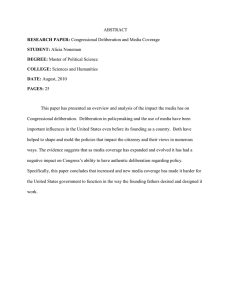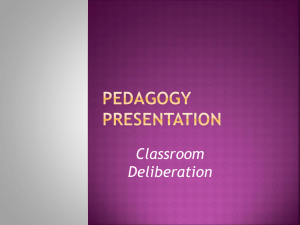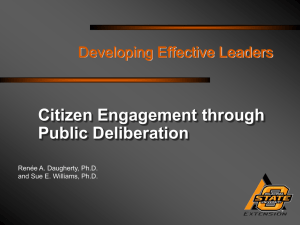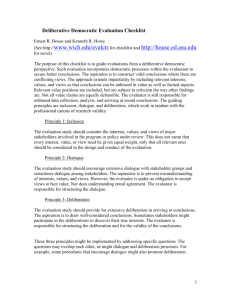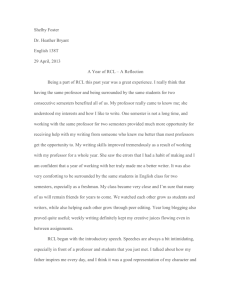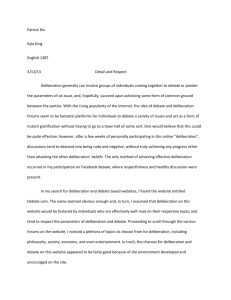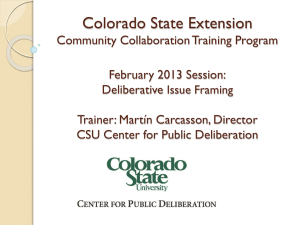Neither Passion Nor Power
advertisement
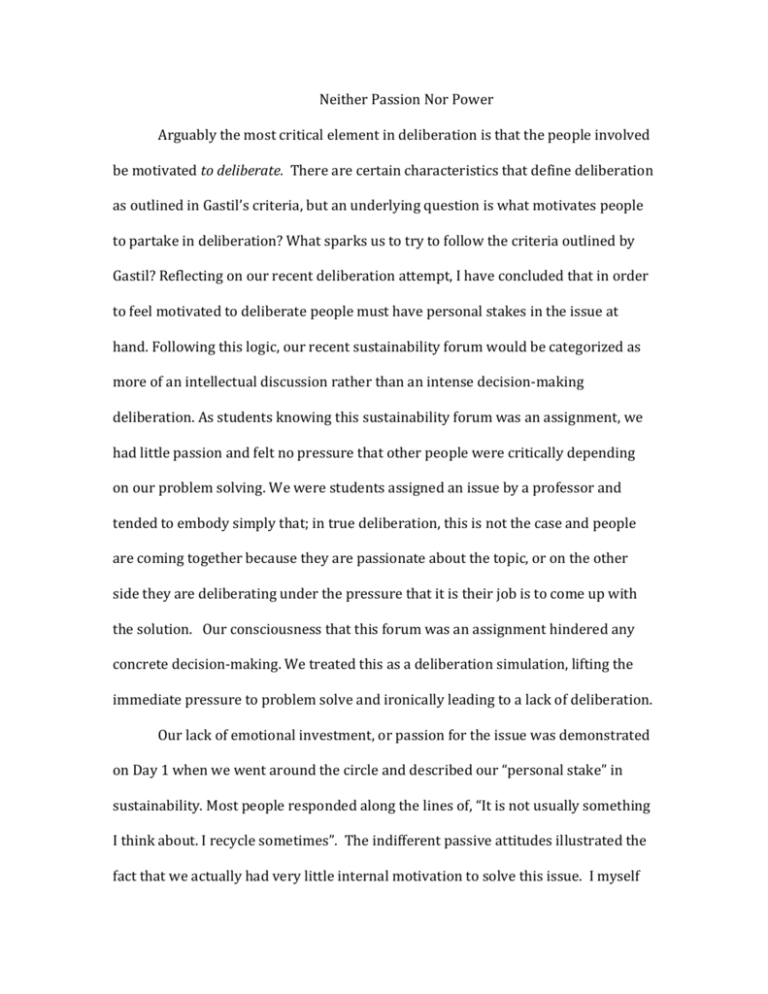
Neither Passion Nor Power Arguably the most critical element in deliberation is that the people involved be motivated to deliberate. There are certain characteristics that define deliberation as outlined in Gastil’s criteria, but an underlying question is what motivates people to partake in deliberation? What sparks us to try to follow the criteria outlined by Gastil? Reflecting on our recent deliberation attempt, I have concluded that in order to feel motivated to deliberate people must have personal stakes in the issue at hand. Following this logic, our recent sustainability forum would be categorized as more of an intellectual discussion rather than an intense decision-making deliberation. As students knowing this sustainability forum was an assignment, we had little passion and felt no pressure that other people were critically depending on our problem solving. We were students assigned an issue by a professor and tended to embody simply that; in true deliberation, this is not the case and people are coming together because they are passionate about the topic, or on the other side they are deliberating under the pressure that it is their job is to come up with the solution. Our consciousness that this forum was an assignment hindered any concrete decision-making. We treated this as a deliberation simulation, lifting the immediate pressure to problem solve and ironically leading to a lack of deliberation. Our lack of emotional investment, or passion for the issue was demonstrated on Day 1 when we went around the circle and described our “personal stake” in sustainability. Most people responded along the lines of, “It is not usually something I think about. I recycle sometimes”. The indifferent passive attitudes illustrated the fact that we actually had very little internal motivation to solve this issue. I myself admitted on the first day that sustainability was not often on the forefront of my mind and I clutched my paper coffee cup as an example. We had no green enthusiasts in the room to balance our passivity and foster enthusiasm, further enabling us to accept and stick with our initial perspectives. The overall complacency caused a limited information base. Weeks ahead of time we were given the National Issues Forum pamphlet and told that we should thoroughly read it, but we were welcome to bring in outside sources and opinions. However, many of us did not go out of our way to gain a breadth of knowledge on the issue. If we all had been passionate of the issue, I am sure we would have. In the instances when people did take the initiative to expand their knowledge, others became concerned that it was outside the guidelines of the assignment. For example for stance two, I came in with information on the global LEAD initiative, leadership for environment and development, suggesting we should consider the innovative ways this program is promoting sustainability. However, I felt that I was immediately questioned on whether bringing in that information was fitting to the assignment because this was an opinion outside the pamphlet. This moment provides evidence of our lack of deliberation due to our consciousness of our assignment. In real deliberation there is no a limit to knowledge and we would not be seeking approval for what we could and could not know. We would be searching for every possible solution every chance we could. The lack of urgency to make a solution comes directly from the majority’s attitude that our decision did not matter. What would have happened if we had come up with a solution? Would we have implemented it? We felt like we had no power to make a change. This I think is key in deliberation: we must not only feel passionate about the issue, but we must feel like we have some sense of control and power to fix the issue. Because we were trying to come up with national and global solutions, it felt so out of our reach that we lost hope and initiative. Looking back, we should have focused on the potential to come with a solution for our personal actions then maybe we could have made a difference. Again though this was not the original intention of the deliberation, so we stuck to the agenda attempting to find a national solution. During our wrap up day, I was the “closing representative” and to be honest, I entered optimistically hoping we could come together to make a decision. However within minutes I realized I was failing to inspire problem solving. We left the final discussion without a concrete answer. I initially felt dissatisfied and frustrated. However, importantly, after a few hours, my dissatisfaction subsided. This fact alone is further evidence that I had little emotional investment in succeeding in finding a solution. The lack of pressure or care to come up with a solution Having said that, a lack of solutions does not mean the entire sustainability forum was unsuccessful for it illustrated a respectful intellectual discussion. We may have failed to fully deliberate but we definitely listened to each other’s ideas and that counts for something. After our first day, I even reflected on how I was impressed with how cordial everyone was and how well we got along. There was no fighting and little tension. We were able to bounce ideas off of each other. I definitely learned a lot about sustainability and it was overall refreshing to have us all thinking, discussing, and collaborating. We had a lot of potential and there was no huge failures on our attempts to deliberate. There was just a lack of the necessary passion and power to transition an intellectual discussion into an intense deliberation. If we were to compare this deliberation simulation, to real life democracy we would be nowhere close to how it functions. For example those in congress have a lot of passion and power when deliberating. They are elected to solve national issues and feel the immediate responsibility and pressure to act accordingly. Furthermore it is likely they chose this line of work because they are passionate about the issues at hand. If they have an idea, they have the power to possibly make it a form of law. Also they are required to read, learn, and know about their issues before even considering discussing them. In contrast our deliberation involved a lot of learning in the process of attempting to deliberate and we had little faith that we would make an impact. For effective and successful future deliberation to take place in the classroom, I believe it would need to stem from a place of passion within the students, or intense pressure and responsibility from the outside world
